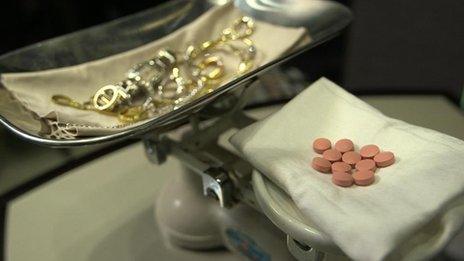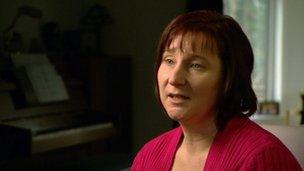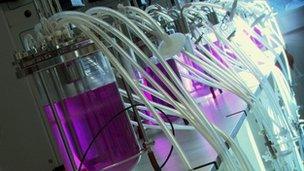Orphan drugs: Remarkable drugs at remarkable prices
- Published

The orphan drug market is currently said to be worth $50bn and is growing at about a rate of 6% per year
It's one of the oldest debates in economics: what's the difference between what something costs and what it's worth?
The debate has been given new life by the advent of orphan drugs.
The term was coined in the US. They are "orphan drugs" for the simple reason that they were designed to treat orphan diseases - conditions so rare that only a relative handful of people are affected.
Lesley Loeliger, who lives just to the south of Glasgow, remembers the day she was diagnosed with the orphan disease Paroxysmal Nocturnal Haemoglobinuria - PNH for short. The doctor explained it was a bone marrow disease with a median survival rate of just 10 years.
Its effects were dreadful.
"I was having to be carried up and down the stairs," she says.

Lesley's life has been transformed by the orphan drug Soliris
"I was having to be dressed and undressed. I just couldn't do anything for myself. Sometimes, when I was so bad, and I was so exhausted I couldn't even turn over in bed."
Since then, Lesley's life has been transformed by an orphan drug called Soliris.
It's an exceptional treatment at an exceptional price. At £250,000 per patient, per year, Soliris is the world's most expensive drug.
Scotland's medicines watchdog, the Scottish Medicines Consortium, says Soliris isn't cost effective and doesn't recommend its use in the NHS. But Lesley and eight other patients are receiving the treatment because the Scottish government accepts there is no other treatment suitable for them.
'Big business'
Soliris's makers Alexion say its price is fair as they bore "enormous costs and risks" in the drug's development.
They say one-third of patients died within five years before Soliris was available, and governments and private insurers in more than 35 countries recognise its value.
Soliris is exceptional but not unique. More than 60 orphan drugs are approved for use in Europe. Not all are as expensive as Soliris, but taken together the sector spells big business.
Dr Kiran Meekings, of Thomson Reuters Life Sciences, has been analysing the sector.
She says the potential profits are huge: "The orphan drug market at the moment we know is $50bn and growing ... at about a rate of 6% per year.
"Soon that's going to become a very large sum of money, so with regard to the future projections, it'd be interesting to see what the market can bear."
The drugs industry says the prices of orphan drugs reflect the cost of research.
Dr Frances Macdonald, from the Association of the British Pharmaceutical Industry, says it costs roughly £1bn to bring a new drug to market.
"Also," she says, "the one medicine that makes it to market has to recover the cost of those that didn't.
"And of molecules that go into basic research, only about one in 5,000 will come through. And of those that start in phase 1 clinical trials, only about one in 10 will come through."
It seems counterintuitive - and contrary to the time-honoured teaching about economies of scale - that medicines targeted at a relatively small number of patients could be worth the effort of the pharmaceutical industry.
That was the argument which led the authorities on both sides of the Atlantic to offer incentives to develop orphan medicines: subsidies for research, tax breaks and marketing monopolies.

The Scottish government is investing £21m in a fund to pay for orphan drugs
But Dr Carl Heneghan, director of the Centre for Evidence Based Medicine at Oxford University, fears this could backfire to the cost of the NHS.
"There are lots of orphan drugs and lots of orphan diseases still to be tackled," he says, "and actually we could start swamping healthcare payers with costs across the board with these very expensive drugs.
"And they get overwhelmed and just say actually we can't look at any of these - there's too many coming our way."
The Scottish government is investing £21m in a fund to pay for orphan drugs. A wider review is also under way into how new drugs become available on the NHS.
Ultimately, it'll come down to that difference between how much things cost - and what they're worth. And to Lesley Loeliger, Soliris is priceless: "To me this drug is a miracle.
"My family had to face the possibility of me going in 10 years. My husband had to face the chance of bringing up the children on his own.
"My mum and dad faced the possibility of losing their daughter. And I appear to be getting better."
BBC Scotland Investigates: Life, Drugs and Enormous Amounts of Money is on BBC One Scotland at 10:35 on Wednesday 16 January, and for a week afterwards on the BBC iPlayer.
- Published16 January 2013
- Published16 January 2013
- Published14 January 2013